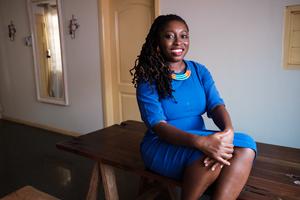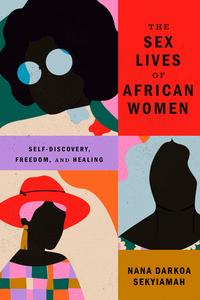
|
|
| Nana Darkoa Sekyiamah Photo: Nyanyi Quarmyne | |
Nana Darkoa Sekyiamah is the author of The Sex Lives of African Women, which Astra House will publish in March 2022.
How important was your blog "Adventures from the Bedrooms of African Women" to the creation of this book?
The Sex Lives of African Women wouldn't exist if my best friend Malaka Grant and I had not created "Adventures from the Bedrooms of African Women." For over a decade I have been encouraging African women to share their experiences of sex and sexualities, and in that time I learnt just how dynamic, complex and fascinating our experiences are. I had also seen African women take agency over their sex lives in ways that I didn't see portrayed in the media, and that is why I wanted to write a book that showed the full complexity of our desires, pleasure and sexual experiences. I hope spaces like our blog, my book and Adventures Live (a festival on sex and sexualities we have convened annually for the past three years) encourage women to continue to explore paths to sexual freedom and liberation.
There is, globally, an oversexualized portrayal of African and African-American women and this stereotype that they are in danger or distress and need to be controlled or "saved." How does your book address these stereotypes?
I think one of the things that is very clear from my book is that African, African-American and Afro-descendant women are saving ourselves. We're pushing back against the societal norms that try to limit us and we're expanding our understanding of our identities, and actively creating models of freedom that everyone else can learn from. Stories by women like Helen Banda, a Zambian woman now resident in the U.S., and Alexis Deveaux, a woman of Afro-Caribbean and African-American heritage, are inspirations for all of us who seek to live radical lives of abundance and pleasure.
 The North American edition of your book is publishing in March 2022. What can you tell us about how it differs from the U.K. edition? What are you most excited about when you think about the book being published in the U.S.?
The North American edition of your book is publishing in March 2022. What can you tell us about how it differs from the U.K. edition? What are you most excited about when you think about the book being published in the U.S.?
I feel like the North American edition of my book is an entirely new book. Everyone who loved the U.K. edition should also buy the American edition :) Seriously. My incredible editor Alessandra Bastagli pushed me to weave more of my own story in the book and I am so glad I did. Readers will get insights as to why I chose to interview the women that I spoke to, and learn about what I personally took away from all those conversations. I am also super excited about this book speaking to Africans in the Diaspora, and African-Americans and Afro descendants. I feel like we often hear about the Diaspora wars, and this book shows that we have more in common than what divides us. I consciously claim the global African diaspora in this book. As a pan-Africanist, I recognize that we are divided by the legacies of slavery, colonization and migration, and so this book is also to say that we are all family.
Some of the women you interviewed in the book are based in the U.S. Did you notice patterns in their stories and struggles that are unique to American society? In what ways were they similar to the stories of other women around the world?
The main difference between the experiences of women in the U.S. versus the majority of the African continent is the civil rights gains that have been made in the U.S. in regards to LGBTQIA rights. At the same time, we know that legal rights do not always translate to equitable socio-cultural change. Nevertheless, it did feel like folks in the U.S. had more space to navigate openly queer relationships for instance. Overall, there were more similarities than differences, especially in terms of people being raised without much access to comprehensive sex education, struggling to own one's sexuality/taking time to come into one's queer identity because of queerphobia, especially in younger years.
What are you hoping readers in the U.S. will take from your book? What kind of conversations are you hoping readers here will have when they read your book?
I wrote this book because I wanted to continue to create space for African women to talk about sex. A subject that we are often told is "private" and only to be discussed in closed quarters. On the contrary, we know sex is a deeply political issue--it is why some countries try to legislate who we love or choose to have sexual relationships with. I feel that by having conversations about sex we will also learn to take control over our own bodies and pleasure, and that is a radical act of self-love.

